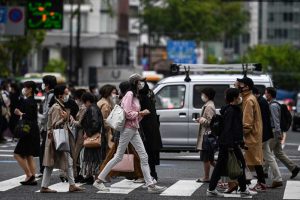Japan places Tokyo under Covid-19 state of 'quasi-emergency'

- Prime Minister Yoshihide Suga said the restrictions were needed to prevent regional outbreaks from turning into a nationwide wave.
- "We ask that people refrain from unnecessary travel between prefectures as much as possible," Suga said in televised remarks.
- Japan's total Covid-19 cases crossed 500,000 on Friday, according to domestic media tallies.
Japan placed Tokyo under a new, month-long state of "quasi-emergency" on Friday to combat surging Covid-19 infections, less than a month after the capital and host of the Summer Olympics lifted a broader state of emergency.
Prime Minister Yoshihide Suga said the restrictions were needed to prevent regional outbreaks from turning into a nationwide wave.
"We ask that people refrain from unnecessary travel between prefectures as much as possible," Suga said in televised remarks.
In a meeting with experts, Economy Minister Yasutoshi Nishimura proposed a month of targeted restrictions in Tokyo, like reduced business hours for bars and restaurants, along with 24 days of curbs for Kyoto and Okinawa, starting on April 12.
That would take the period of restrictions through Japan's annual "Golden Week" holiday season from April 29 to May 5.
Japan's total Covid-19 cases crossed 500,000 on Friday, according to domestic media tallies. There have been 9,331 deaths, according to the health ministry, low compared to most major economies, but concerns about a new wave of infections are rising, particularly with the hosting of the postponed 2020 Summer Olympic Games coming up fast.
On Monday, Japan placed the western prefectures of Osaka and Hyogo, along with Miyagi in the northeast, under targeted lockdown measures. Osaka, home to about 8.8 million people, has been hit especially hard, reporting a record 905 cases on Thursday.
Tokyo reported 537 new cases on Friday, while Osaka had 883 new infections.
"The mutant strain is spreading rapidly, and we are extremely concerned," said Nishimura, who also heads the country's coronavirus response, speaking at the start of the meeting with experts.
The new measures are based on a revised infection control law and can be applied to a narrower area than the state of emergency that Suga declared for most of the country in early January.
The controls allow regional governments to order businesses like bars and restaurants to shorten operating hours and to impose fines of 200,000 yen ($1,820) or publish the names of those that do not comply.
Source: Read Full Article
